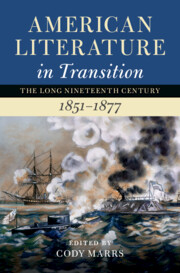Book contents
- American Literature in Transition, 1851–1877
- Nineteenth-Century American Literature in Transition
- American Literature in Transition, 1851–1877
- Copyright page
- Contents
- Figures
- Contributors
- Series Preface
- Introduction
- Part I Careers
- Part II Networks
- Part III Exchanges
- Part IV The Long Civil War
- Chapter 17 The Coming Civil War
- Chapter 18 Union Literature
- Chapter 19 Confederate Literature
- Chapter 20 Reconstruction Literature
- Chapter 21 The Global Civil War
- Index
Chapter 20 - Reconstruction Literature
from Part IV - The Long Civil War
Published online by Cambridge University Press: 15 June 2022
- American Literature in Transition, 1851–1877
- Nineteenth-Century American Literature in Transition
- American Literature in Transition, 1851–1877
- Copyright page
- Contents
- Figures
- Contributors
- Series Preface
- Introduction
- Part I Careers
- Part II Networks
- Part III Exchanges
- Part IV The Long Civil War
- Chapter 17 The Coming Civil War
- Chapter 18 Union Literature
- Chapter 19 Confederate Literature
- Chapter 20 Reconstruction Literature
- Chapter 21 The Global Civil War
- Index
Summary
This brief essay addresses this volume’s multiple audiences – including undergraduate and graduate students; instructors who want to incorporate a new unit on Reconstruction into a colonial and US literature survey course or to teach a class on the subject; and scholars of American literature who might or might not work in the second half of the nineteenth century – who would benefit from a basic map to the significant changes now in progress in Reconstruction studies and strategies for teaching them. Within the past decade in particular, renewed and transformative interest in Reconstruction has moved to the forefront of the fields of US history and nineteenth-century US literary history. While the Reconstruction period has long been a staple in the field of US history (however troubled that narrative might have been, a topic to which I will turn shortly), that has notably not been the case in the field of literary studies. As Gordon Hutner points out in his introduction to the 2018 special issue of the flagship field journal American Literary History entitled “Reenvisioning Reconstruction,” Reconstruction has been “among the subjects least touched” by scholars otherwise energetically focused on revising field assumptions and canons. Scholarship to remedy this stark neglect and debates about how to do so have recently risen to the top of the disciplinary agenda. As Hutner puts it, “A nucleus of scholars has been revisiting the period and committing a great deal of industry and intelligence toward uncovering its critical exigencies in ways that previous generations of Americanists had missed.”1
Keywords
- Type
- Chapter
- Information
- American Literature in Transition, 1851–1877 , pp. 322 - 336Publisher: Cambridge University PressPrint publication year: 2022



